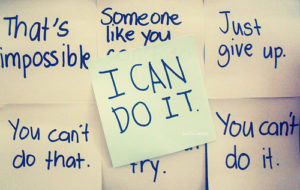
There is nothing like the holiday season to bring up pain and suffering for many of you. It is supposed to be a season of light and love and yet many of you find yourself overusing and overeating and feeling guilty for not doing enough or buying enough. It is exhausting!
Your critical voice is a common and unfortunate constant in your life. This internalized voice assumes the tone and language of your mother, father, religion, culture and while you are working on this lifetime I believe those voices are of our ancestors as well. The critical voice makes sure that with every step forward you feel doubt and fear, like you are damning your choices.
For many of you even the word “critic” is too mild a word. The voice you hear is relentless, a vicious screaming that cripples and controls. You may call this voice the “Self-Hater” or the “Killer Critic.”
Not everyone hears self-hatred as a voice in their head. Sometimes, it’s a way of being that manifests in myriad forms, including:
hating how you look in the mirror at every size, weight or age.
sabotaging healthy relationships or good jobs.
• attempting to prove worthiness by being perfect or through high achievement
• being drawn again and again into abusive situations.
Where Does the Critic or Self-Hater Come From?
A Protector
In Embracing Your Inner Critic, Hal and Sidra Stone write that in order to protect you from the pain and shame of always being found “less than,” a voice develops within you “that echoes the concerns of your parents, your church or other people who were important to you in your early years.” That voice criticizes you before anyone else can.
Punishment
Cheri Huber, author of There Is Nothing Wrong with You: Going Beyond Self-Hate, sees the culprit in childrearing practices based on punishment. These practices, she says, teach us that you need to be punished in order to be good. Because we as a culture believe that punishment is the path to goodness, we continue to do it to ourselves as adults.
Internalized Shame
Internalized shame from having been molested, neglected or abused as a child can create the most vicious forms of self-hatred. Sarah was molested by her father and lived constantly with a voice in her head that told her she was unworthy of living her life. She used to silence that voice with alcohol and drugs. “Only when I was high,” she says, “did I have any peace.”
How Can I Get It to BE QUIET?
Understanding where the Critic originates is helpful, but then you have to ask, how can I get this voice to leave me alone? Many who have tried to argue or fight with or ignore it would attest to the futility of those tactics. Here, instead, are three strategies that have helped others.
Meditation. In There Is Nothing Wrong with You and its follow-up When You’re Falling, Dive, Huber lays out a process in which you learn to listen to and then disbelieve the voice—to unlearn the lie that something is wrong with you. When Crystal started listening with detachment, she was shocked to discover that her crushing voice thought it was helping her become a better person by screaming her “flaws.”
Therapy. Skilled facilitation can be crucial for healing the childhood traumas that often give rise to the Self-Hater. You may need antidepressants and some kind of support or therapy. Please do not make yourself wrong for that. You are OK for needing support. Sarah found relief and detachment from the voice and realized that her self-hating voice jump-started her depression and addictions. Through therapy, she’s gradually coming to accept herself just as she is. She still hears the voice, but it doesn’t drive her to use anymore or to despair.
Understanding the Message Beneath Your Shadow Self.
I recommend dialoguing with your Inner Critic—and learning how to be with what I refer to as our shadow self.
One can do this with a therapist, a coach, a support group or in your journal—in order to understand what the shadow self is trying to communicate. Francis tried this approach in her journal, writing out each of her parts, as though they were having a conversation. She discovered that the voice that always called her fat and stupid was afraid that if she liked how she looked, people would no longer like her. She still hears the voice, but now considers it a call for help to which she responds with compassion and curiosity. When it starts calling her names, she asks what it is afraid of, thus defusing its previous power over her and sometimes gaining useful information.
The goal in these strategies is not to silence your inner critic or self-hater, but to transform it by disbelieving its slander, facing the traumas that empower it and understanding what it really fears, as well as the needs from which it may spring. You may never silence the voice completely, but it is possible to lessen its impact, and find relief and healing. As I say to my students all the time, the critical voice can get very quiet if and when we do what it takes.
Do you have any healing stories to share about how you quieted your inner critic? If so, please comment below.







